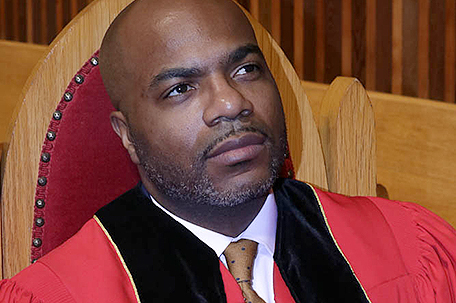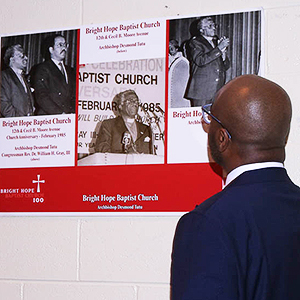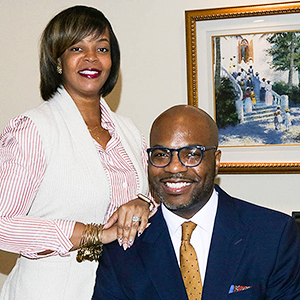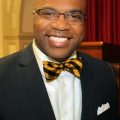
ABOVE PHOTO: Rev. Dr. Darron D. McKinney, Sr. (Photo credit: Kala J.)
By Amy V. Simmons
Under the watchful gaze of the world’s largest facial depiction of Christ — a Black face in stained glass that overlooks the entire sanctuary –the Rev. Dr. Darron D. McKinney, Sr. delivered the message to members of the historic 106-year-old Bright Hope Baptist Church at the church’s annual Watch Night service on New Year’s Eve.
During his Watch Night sermon based on Psalm 30:1-5 — McKinney — an accomplished pastor, community leader, organizer, activist, ministry consultant and faith-based developer — told the congregation that in spite the hardships, frustrations and “midnight moments”of the past year, there is hope.
“And if we can be honest tonight, the challenges of 2017 made you want to holler and throw up your hands!” McKinney told the congregation. “Because no doubt you wanted to throw in the towel. No doubt you wanted to call it quits! But the text is tailored to teach us that though we have midnight moments, we can celebrate because morning joy is on the way.”
Dr. McKinney, 35, is a cum laude graduate of Lane College in Jackson, Tennessee with a Bachelor of Arts degree in Religion and Political Science. He also holds a Master of Divinity degree from the Memphis Theological Seminary and a Doctorate of Ministry in the area of Prophetic Preaching from the United Theological Seminary in Trotwood, Ohio.

Rev. McKinney observes Bright Hope Baptist Church’s history. (Photo credit: Kala J.)
As the innovative leader of Macedonia Baptist Church in Baltimore, he helped to spearhead several programs and initiatives that addressed the city’s entrenched racial and socioeconomic injustice issues. As a result of McKinney’s sound leadership, Macedonia grew and was able to purchase enough land to build a community center, affordable homes and a mixed-use commercial development, a project that is still ongoing.
Along with his work at Macedonia, McKinney offers peer and professional counsel to doctoral students at United Theological Seminary. He has also served on the Re-entry Advisory Committee for the Baltimore City Police Dept., the Local Hiring Advisory Board for Sagamore Development Corporation’s Port Covington project, and has worked with many other community-focused organizations.
McKinney and his wife, Billiejo, have three children — Brayden, Darron, Jr. and Diamond.
The SUN spoke to McKinney about his vision for the church, how he hopes to use his experiences in Baltimore to make things better for his new community, and the one local tradition he’s already engaged in.
SUN: Welcome to Philadelphia! How many years have you been a pastor, actually?
DM: I’ve been in senior executive leadership ministry for almost 13 years now.It started at my home church, Mount Vernon Baptist Church in Memphis, Tennessee. My pastor – the Rev. Dr. James L. Netters — was synonymous to the Rev. Dr. Bill Gray III, in that he was the first African- American councilman in Memphis, and the first African- American administrative assistant to the mayor there.
He was [also] instrumental in bringing [Dr.] King to Memphis during the [1968] sanitation strike and marched with him. The night King was assassinated, City Council was in the hotel deliberating[over] if they were going push for the raise that night. They voted before knowing that he was assassinated, They made a promise to not make it known publicly because they agreed that they wanted the citizenry to believe that it was because of King’s assassination.
So my pastor — whom I love so much — took a chance on me in 2005 and allowed me to serve as associate pastor with the responsibility for the children and youth outreach. When I graduated from Lane College and came back home, I told my pastor that I had received a scholarship to Harvard Divinity School. He said ‘No! You’re going to Memphis Theological Seminary!’, which was the seminary he went to.
In 2009, I was elevated to the assistant pastor position[at Mount Vernon]. In 2011, I was called to Baltimore to serve as pastor at another historic institution, Macedonia Baptist Church. I served there for 6 1/2 years, and now I’m here — excited about what God is doing in our life.
SUN: What does it mean to you to be stepping into the provenance of Bright Hope and legacy of Dr. Bill Gray III?
DM: I’m humbled and honored when I consider how God selected me to serve in this sacred space. It is a humbling experience to know that[although] I can’t fill his shoes, I can only attempt to walk in his footsteps to ensure that the rich legacy that has been implemented moves forward. It is my mission — my goal — to make sure that Philadelphia knows that Bright Hope is still alive. We are excited about what God is doing. We’re going to make sure that this historical institution remains an anchor institution in our community and our city.
SUN: How do you feel your experience as a young urban activist church leader has prepared you to take the reins of this church?
DM: I credit my time sitting under the tutelage of my pastor. He is 90 years old, and still gives counsel to me; I am big on leadership and submitting to authority. My tenure in Memphis — as well as in Baltimore — prepared me for this moment.
For the 6 1/2 years I was a senior pastor in Baltimore, I had hands-on experience with other pastors in the area in making sure that the prophetic voice of the church is articulated. Oftentimes, pastors think that the prophetic witness should be muffled, but it is my contention that throughout scripture, Jesus raised his prophetic voice.
This is what my book — “A Prophetic Witness For The Marketplace”– will entail. It is about the call to prophetic preaching, and rediscovering the role and responsibility of the African- American preaching tradition, underscoring, through scripture, what the prophetic witness is all about — speaking truth to power.
I am convinced that my tenure as pastor has shaped me into knowing how to implement and how to redefine those initiatives in regards to social justice and social activism.
[For instance], when the Freddie Gray incident happened in Baltimore, a young man who was murdered at the hands of the police, it was almost a stone’s throw away — a couple of blocks — from my church. In fact, it is alleged that some of the actions that happened [leading up to the shooting] were right near my church. Because of the historic institution of my former church, [I felt] it was my responsibility to partner with the city.
We met with the mayor, asking how can we implement action plans, making sure that policies and police reform were implemented. We met with grassroots organizations to talk about how can we create a safe space for our citizens. So that, in a small sense, is of some of the things that as pastor in Baltimore that I performed. I believe that Philadelphia is Baltimore. It’s bigger, but there are always problems in urban centers. It is important for the pastor to be the prophetic voice to speak truth to power, because historically, in the African- American church, there has been the impetus of the Black preacher speaking truth to power, addressing all of those things.
SUN: Would you consider urban activism and your calling similar?
DM: I believe it’s one and the same. I believe that every pastor should speak truth to power on the social justice issues that confront the citizenry. Now, what happens, though, is this — when the church doesn’t do what they are called to do, then you have a “Black Lives Matter” movement that springs out. The Black Lives Matter movement came about because the church failed to speak to those issues. It is my contention is that when the Black church speaks to these critical issues, that change can really manifest. Not just speak to it, but also bring substantive action plans on how we can see the tide change.
SUN: Do those solutions or actions include a Black Lives Matter or some of the groups that have stepped into the void?
DM: Most definitely. It is important that everyone is at the table. Oftentimes, individuals sit in their silos. What happens is we’re so divisive, there’s no unity.
SUN: So unity is key.
DM: Exactly.
SUN: Tell me a little about the development project at Macedonia.
DM: When I arrived at Macedonia, the plan was to build a life center, so we shared with the city our need to acquire the property. Years before me, the church and leadership worked to acquire the property. Under my tenure and leadership, we were able — along with the partnership of our city officials and state legislators — to reach a negotiation. One of the things I tout is ‘Turnaround Tuesday.’
‘Turnaround Tuesday’ is a jobs movement whose birth came through Macedonia. One of the things we discovered was that returning citizens did not have the tools needed to land a job. Not only the tools, but they were marginalized by their background. So, every Tuesday and Thursday, we have hundreds of individuals come to the church to get the necessary tools to land a job and keep a job. From that, along with the BUILD organization — Baltimoreans United in Leadership Development — we’ve seen over 360 individuals receive living wage jobs. From that, all of the social service programs we provide, the land would have created a space for those opportunities for us to continue to have our spiritual footprint in our community.
SUN: Was the area where Macedonia is located gentrifying like the area near Bright Hope is?
DM: When I arrived in Baltimore, it was a blighted community. When I got out of the car I said, ‘ Oh, yeah – we moving on up!’… dilapidation, boarded up housing, trash everywhere. I said, ‘God, really?’ It was in that moment that God said, ‘this will be your place to change the trajectory of the landscape,’ and we were able to do that — we were able to put a small fingerprint into changing West Baltimore.
We’re excited about that, because oftentimes, individuals look at the African-American preacher as one who only stands in the pulpit, and who doesn’t have tentacles into the community, in development, etc. I was able to sit on the Port Covington’s jobs board. Port Covington [a 235 acre, mixed-use redevelopment Baltimore City waterfront project] is under the auspices of Under Armour’s Kevin Plank. We were able to have conversations with Plank and his executive staff on how Baltimore’s citizens could benefit through Port Covington.
Port Covington is a billion dollar project…the plan is to create mixed-use, affordable housing. One of the challenges we learned about from the Freddie Gray crisis was that because [residents felt that] ‘this is not my home, I don’t have ownership or [need to]make sure it’s being maintained. So, I’m going to riot and burn it, throw bricks at it.’
That’s one of the things we learned as we had case studies with many of those persons in McCulloh Homes[public housing project in Baltimore]; those were some of the things they were saying. From that, we discerned that affordable housing was important.
SUN: Is the long-term goal of affordable housing for people to be able to remain in these neighborhoods that are gentrifying?
DM: To be clear, the city was already gentrified. They had torn down many of the towers and built an interstate that was supposed to go somewhere, but didn’t go anywhere…individuals were then shipped out to the county. The premise was — in partnership with many pastors in our area — to have conversations about housing for persons of color who live well below the poverty line in West Baltimore.
“Churches for Community Development” is one of the umbrella organizations which I served as a principal of, [along] with many other West Baltimore pastors. Those are some of the social activism and social justice initiatives and economic empowerment opportunities that we worked tirelessly on…there were also ecumenical opportunities to partner with our other colleagues.
SUN: Tell me more about “A Prophetic Witness for the Marketplace.”
DM: The book is my dissertation. Many of my colleagues have been challenging me on making that [into] a hard copy for the public. Out of that stems from scripture what I believe Jesus called for the church — to speak the truth to power, to those persons who are oppressing others.
So, from a historical perspective, it dates back to the Black church…even from slavery, all the way back there. It continued to the 60s — the preaching, the tone and tenor of that time, what the Black church was at that time is juxtaposed with what the Black church is now. That dissertation unpeeled layers of “prosperity preaching” from what is “prophetic preaching.” There also some practical applications about how pastors can best utilize this model in their own preaching to move beyond the walls into the community. It is my contention that the preaching moment goes well beyond the pulpit, and should spread to the marketplace. So that is the nuts and bolts of the book.
SUN. So, will it be available to the public at some point?
DM: Yes, that is the goal. [We’re] even looking at a workbook; I’ve been meeting with some of my colleagues, and we’ve been talking through this.It should come to fruition soon.

Bright Hope Baptist Senior Pastor Rev. Dr. Darron D. McKinney, Sr. and First Lady Billiejo McKinney. (Photo credit: Kala J.)
SUN: As a younger preacher, do you hope to bring younger people into the church?
DM: My wife always gives me this moniker — she says I’m a ‘young man with an old soul.’ It is my prayer that God allows me to be the agent to bring all people to a connection with Jesus Christ — young millennials, middle-aged adults, and even seniors. What often happens to younger pastors, though, is this — older members see that a young pastor my age,35, will kind of focus directly on [recruiting] the millennials. That is not healthy for the make up of the church. But the Catch 22 is this; if we don’t focus on the millennials, we’ll lose them.
That’s one of the challenges I had at my first pastorate. I came in the door at 28, and I missed the opportunity to grab those millennials because I was more concerned about what the senior members would say about me focusing on them. So, it’s going to be my responsibility to make sure that we have ministry models that meet all age demographics, specifically our millennials, because we know that our seniors, our middle-aged members are more firm in the faith. It is important to bring those millennials in because they are the future. We have to be innovative in our approach to grab them and retain them.
SUN: What are some of your plans for re-entry projects, addressing unemployment and gentrification, and some of the political forces. How do you plan to tackle that in Philadelphia?
DM: The short answer is I don’t know. Oftentimes pastors come in the door saying that ‘this is what I’m going to do — I’m going to bring everything from my former church and bring it here.’ It doesn’t work. Every church doesn’t fit the same mold.
Politically, what happens in Baltimore might not be politically expedient in Philadelphia. To that end, my initial purpose and goal is to love all the people here; from that, we will see then how best we can tackle some of the issues outside of the church.
God has called me to serve a great church; it is my responsibility to do that, but we’re not going to move in haste and tend to those community issues right off, because we want to make sure we are feeding the people, then have conversations with community leaders to see what the issues are.
It’s going to be our goal and responsibility to make sure that we stay in partnership with Temple, since Temple is in our backyard. I know that our church has a great, lasting relationship with Temple and we’re going to make sure that the relationship continues.
SUN: Is there anything else you’d like to add?
DM: I’m just happy to be in Philadelphia. Philadelphia is a great city, a great town. I had the opportunity in September to have a cheesesteak — a Philly cheesesteak! My wife and I have had many “Philly cheesesteaks”– well, I’m sorry — many “cheesesteaks” — so we got a Philadelphia cheesesteak – the real deal. Let me tell you how real it was; we took a train ride back to Baltimore –about an hour — and got to the house 40 minutes later, and got the boys to bed. Later on that night, we ate a cold Philly cheesesteak, and it was so good! (Laughter)
So, my wife and I are happy to be in Philadelphia and are looking forward to becoming residents of this great city. Philadelphia has a great history, and we’re glad to be a part of it. I’m honored, Amy, that you thought enough of it to interview me, so I thank you.
SUN: You’re welcome. Welcome to Philadelphia!
For more information about Bright Hope Baptist Church and for updates on Rev. McKinney’s book project, visit: http://brighthopebaptist.org. You can also contact the church at: (215) 232-6004.
















Leave a Comment